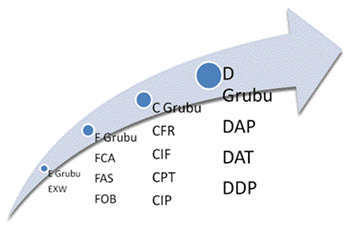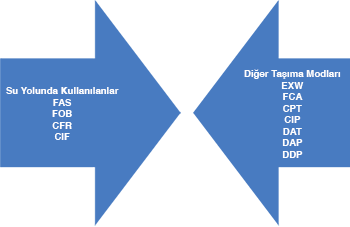Incoterms


Delivery in Commercial Enterprise
seller notifies the buyer by keeping the goods ready for the buyer's order on the date determined before in his business. The buyer takes delivery of the goods from the enterprise, prepares the necessary documents for export, completes the customs procedures and imports the goods to his own country. From the delivery of the goods at the enterprise, all costs and risks and other liabilities related to the goods are borne by the buyer.
Cost of goods and transportation
this form of delivery, the seller undertakes all costs and risks and brings the goods to the port where they will be loaded. It carries out the customs procedures and performs the loading by paying the freight fee. From this moment on, all costs and risks related to the goods other than freight belong to the buyer.
Transportation, paid until.....
This type of delivery is especially used in multi-vehicle transportation. The seller is responsible for paying the freight charge to the designated destination. From the moment the goods are transferred to the custody of the first carrier, all risk and non-freight costs related to the goods pass to the buyer.
Duty Paid Delivery
This delivery method is based on the same principles as the DDU delivery method; however, in the form of DDP delivery, the seller also has to pay customs duties. It transfers goods no different from a local seller in the buyer's country.
Delivery to the
this form of delivery, the seller completes the delivery procedures as soon as the goods are completed customs procedures and transferred to the supervision of the first carrier on the specified date and place. From this moment on, all costs and risks related to the goods pass to the buyer. All costs and liabilities arising from transportation operations are paid by the buyer as well as all other expenses.
Cost of Goods, Insurance and transportation
this form of delivery, the seller takes the insurance premium, freight and loading costs and risks and brings the goods to the port to be loaded. The seller agrees with the shipping agency and pays the freight. It notifies the buyer that the goods in the sales contract have been loaded on the specified date and place. By paying the insurance premium, the seller takes out marine shipping insurance with the narrowest scope suitable for the type of goods loaded. After the goods are loaded on the ship, the freight and expenses other than insurance premiums and any other risk (in the sense of insurance) that may occur, pass to the buyer.
Carriage including insurance, paid to ....
this form of delivery, the seller undertakes the insurance premium, freight and loading costs and risks and brings the goods to the port to be loaded. The seller agrees with the shipping agency and supplies it. It notifies the buyer that the goods in the sales contract have been loaded on the specified date and place. By paying the insurance premium, the seller takes out transportation insurance with the narrowest scope suitable for the type of goods loaded. However, if the buyer wants insurance against extraordinary risks (strike, war, natural disaster, etc.), he may ask the seller to extend the insurance coverage, provided that he pays the premium himself. It is made by the seller %10 more than the cost of the goods.
Delivery at Terminal
DAT clause means that the goods are delivered (delivered) to the buyer at the destination to be unloaded by the transport vehicle, but it can be used multimodal (for multiple vehicles), unlike DEQ, replacing the previous DEQ clause.
On-Site Delivery
DAP clause means the delivery (delivery) of goods to the buyer at a specified point for unloading by the transport vehicle, replacing the earlier DAF, DES and DDU. In both cases, the seller bears the costs of transporting the goods to the designated location / risk of terminal-related loss.
this form of delivery, the seller loads the goods on the ship provided by the buyer at the specified date and place. Any damages, losses and expenses that may occur after the goods are loaded on the ship are the responsibility of the buyer. The seller prepares all the necessary documents for export and delivers the relevant goods by completing the customs clearance of the goods (we are talking about the exit customs).
On-Site Delivery
DAP clause means the delivery (delivery) of goods to the buyer at a specified point for unloading by the transport vehicle, replacing the earlier DAF, DES and DDU. In both cases, the seller bears the costs of transporting the goods to the designated location / risk of terminal-related loss.
this form of delivery, the seller loads the goods on the ship provided by the buyer at the specified date and place. Any damages, losses and expenses that may occur after the goods are loaded on the ship are the responsibility of the buyer. The seller prepares all the necessary documents for export and delivers the relevant goods by completing the customs clearance of the goods (we are talking about the exit customs).